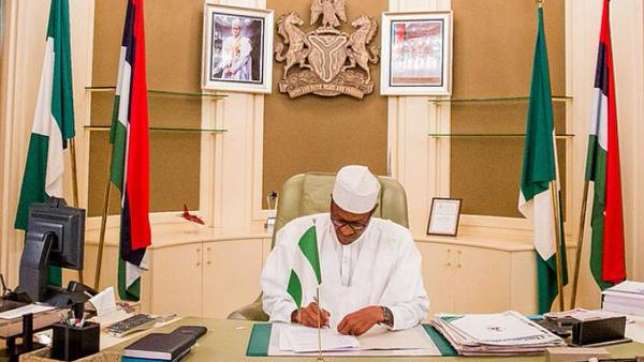
Esther Opaluwah
Civil society leaders have hailed President Muhammadu Buhari’s recent directive to begin the implementation of the UNEP Report on Ogoni land.
The Nigerian President yesterday, stepped up the environmental clean-up of Ogoniland with the approval of several actions for the implementation of the United Nations Environmental Programme (UNEP) Report on the environmental restoration of Ogoniland.
According to an official release, the actions approved by President Buhari, were based on recommendations to him by the Executive Director of UNEP, the UNEP Special Representative for Ogoniland, Permanent Secretaries of the Federal Ministries of Environment and Petroleum Resources and other stakeholders.
The actions include the amendment of the Official Gazette establishing the Hydrocarbon Pollution Restoration Project (HYPREP) to reflect a new governance framework comprising a Governing Council, a Board of Trustees and Project Management. This is even as he had directed stakeholders of the HYPREP Board of Trustees Trust Fund to raise at least $10 million within 30 days of appointment of members of the board.
Civil society groups led by Health of Mother Earth Foundation applauded President Buhari for signaling the real commencement of the clean up of the devastated environment of Ogoniland. The delay in implementing the 4-year-old plan according to them, was unconscionable by all standards. They also noted that the process leading to this had some consultations and that some structures have been established for its execution.
However, they insisted that the body saddled with the task of cleaning up Ogoniland should be renamed as the government is not planning to “restore pollution” as the name Hydrocarbons Pollution Restoration Project (HYPREP) suggests. The object according to them, “is to remediate the environment, not to restore pollution.”
The groups further recommended that the name be changed to Hydrocarbons Pollution Remediation Project (HYPREP) or Hydrocarbons Clean-up Project (HYCUP).
The groups also suggested that the body should be renamed Ogoni Environment Restoration Agency as recommended by UNEP. Reasoning that if the idea is to pave way for an agency that serves the entire Niger Delta, “the needful thing to do, while having a specific project for Ogoniland, would be to rename the Niger Delta Development Commission (NNDC) as Niger Delta Environment Restoration Commission.”
“There are rough edges that still require smoothening for a smooth take off of the clean up project,” notes Nnimmo Bassey, Director of Health of Mother Earth Foundation. “A significant aspect is the non-inclusion of at least one representative of civil society in the structures set up by the President. The role and deep stakes of civil society in the struggle for the clean up of Ogoni land and the Niger Delta cannot be overlooked. Their inclusion is essential for oversight reason
In addition, Bassey also recommended that the new HYPREP or HYCUP should ensure that verified debts owed workers and staff of the defunct body are settled. In terms of the budget to commence the immense tasks ahead, in addition to the $10million from the Federal Government, the polluter, Shell Petroleum Development Company (SPDC), should place the $1billion estimated by UNEP as a start up sum on the table now without further prevarications,” Bassey added.
The groups enjoined the government to ensure that the new body engages in urgent and transparent consultations to agree on steps to be taken, the competences to be employed in the clean up and the milestones to be targeted.
“This laudable step of President Buhari should be followed with a commissioning of environmental audits on other devastated territories in the Niger Delta, in line with the call for one by the people of Egi Land. These should be the starting point for an urgent and thorough auditing of the total state of the Nigerian environment, from the South to the North and from the East to the West,” says George Awudi, a member of the governing board of HOMEF.
The civil society groups commended the Ogoni people for their consistent and dogged struggles to ensure that their environment is cleaned up. With this coming in the year that marks the 20th anniversary of the execution of Ken Saro-Wiwa and other Ogoni martyrs, the activists reasoned that “the sacrifices made by the Ogoni people justify the stanza of our national anthem that declares that the labour of our heroes past shall never be in vain.”









